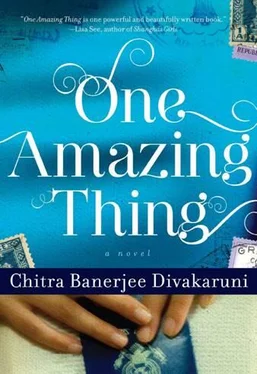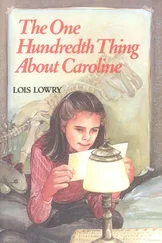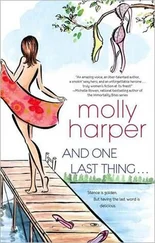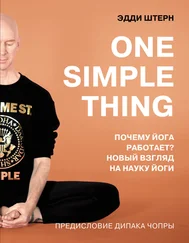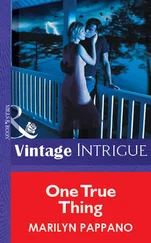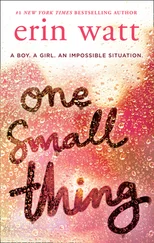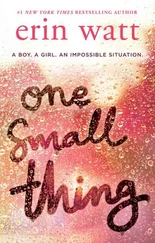THROUGHOUT BOOK CLUB, MRS. PRITCHETT CAN’T STOP THINKING about the couple in the café. In her distracted state, she forgets to bring up her best points during discussion. At home, the Satie makes her want to weep. She stares blankly at the oven while the lamb roasts, trying to figure out why she is so obsessed with the old man and his wife, and when she finally understands, she cannot move. By the time Mr. Pritchett returns from the office, she has made a decision. After dinner, when the men swoon over her trifle and the women clamor for the recipe, which she writes down for them on monogrammed notecards, she tells Mr. Pritchett that she has a terrible headache. Would it be okay if she slept in the guest room? He agrees easily, as she knew he would.
In the room that has rarely harbored guests, she thinks about the children Mr. Pritchett and she could never have. This not-having has been a dull ache at the back of her mind all her life, but today she’s happy about it in a bitter way. If there had been children, she could not have done this. She takes from the pocket of her robe a bottle of sleeping pills-they belong to Mr. Pritchett, who occasionally suffers from insomnia-and takes the entire bottle, along with two glasses of wine.
At first all goes well. On the bed she lies on her back, her fingers linked over her chest like an image on a sarcophagus. The pressed sheets smell of lavender. She feels herself suspended like a jellyfish in the darkening waters of her mind. A little more, a little more. But then her body, wiser perhaps than she is, rebels, forcing her to double over with cramps. She starts to vomit and can’t stop. Mr. Pritchett, who has been catching up on some work-there’s always work to catch up on, even though he’s seventy and could have retired years ago-hears her and comes running, and she ends up in the hospital, getting her stomach pumped.
WHAT TERRIBLE DISCOVERY DID I MAKE THAT PUSHED ME INTO this desperate action? It was this: my husband did not love me the way I needed him to.
Don’t misunderstand me. Mr. Pritchett was a good husband. He provided me with everything I needed and many things I did not need. At dinner he listened (though often with only half his attention) when I told him about my day. How can I complain? When he spoke of his achievements-new companies he’d acquired as clients, or old clients whose financial disasters he’d adroitly avoided-I struggled to hide my own boredom.
There were many things we enjoyed together. Mr. Pritchett was proud of the beautiful and expensive house we lived in, and now that I’ve heard his story, I understand his pride better. He loved to show it off to people he knew, and I loved to show off my cooking skills. And in return we got invited to beautiful, expensive homes with pleasant people in them. (But when I was about to kill myself, I couldn’t think of one person among them whom I would miss, or who would miss me.) We went to the theater and had dinner afterward in a little Italian restaurant on Columbus where the food was superb and the maître d’ knew us by name. We went to the movies, mostly action films and sci-fi, which he liked and I didn’t mind if there wasn’t too much gore. Early in our marriage we used to travel. Europe, Canada, even New Zealand. One year we went on an Alaskan cruise. But it was hard for Mr. Pritchett to be away from the office. He would carry his computer with him everywhere. And when I saw how he struggled upon returning to catch up with his clients, I didn’t feel like suggesting further trips. My favorite activity was lying in bed after dinner, reading, he with his business journals, me with a novel, snuggled under a quilt that I had made.
But after I saw the couple in the café, a great dissatisfaction washed over me. I remembered the old man tilting his head attentively, listening to his wife making her menu choice. Her eyes had shone through her thick glasses as she watched him cut up their desserts for sharing. There was nothing like that tenderness in my life. And without it, what use were the things I’d built my days around? My garden, my home, my activities and friendships, even the time Mr. Pritchett and I spent together-they were all so many zeroes. With the “one” of love in front of them, they could have been worth millions, but as of now, I was bankrupt, and it was too late to start over.
THE FIRST DAY IN THE HOSPITAL, I MOVED IN AND OUT OF A haze that was alternately pain and numbness. On the second day, I began to feel a great shame. I refused to talk to the people waiting to see me: my doctor, the hospital psychiatrist, a social worker, and my husband. I spent the day with my face buried in my pillow, my arms aching with IV needles, plotting how I could do this more efficiently once I was released.
I wasn’t sure when the night nurse came into my room. I awoke and found her standing at the foot of my bed. The lights were off and she left them that way. In the glow of machines I could only see a silhouette, short and thin. Her hair was tied back neatly in a bun. The darkness had turned her uniform gray. When she greeted me, from her accent I guessed-because Mr. Pritchett had many clients from that country-that she was Indian. I pretended to be asleep. Being a nurse, she could probably tell I was awake, but my pretense didn’t annoy her. She hummed softly to herself, a foreign-sounding tune, as she stood there. I waited for her to do nurselike things-check the machines, feel my pulse, give me a shot-but she just stood there. Then, in a whispery voice, she told me that this was her last night at the hospital, and I was her last patient.
I hadn’t expected that. Surprise made me blurt out, “Are you retiring?”
“You could say that,” she said.
“What will you do now?”
“Some people think I should go back to my birthplace,” she said. “But I’ve decided to go where no one knows me. I want a new life.”
Moving to live where no one knew you, shucking off your worn-out life like old snakeskin! The idea ran through me like a shiver. And though I’d been determined not to give anything of myself away in this place filled with concrete and chemicals and cheerlessness, I found myself saying, “That’s what I want also. A new life. This one’s too painful.”
“Why?”
Maybe it was her casual tone. Or the fact that we would never see each other again. I said, “It’s like The Matrix. ” (I wasn’t sure she would be familiar with the movie. I’d gone to see it only because Mr. Pritchett insisted-though then I had been captivated by it. She nodded, however.) “All this time I thought everything around me was beautiful. But in reality I had been squeezed into a cramped, loveless cell. I chose death. I couldn’t see any other way of breaking out.”
“Death is a breaking out of sorts,” she said. “But you won’t necessarily end up in a better place. Especially if you kill yourself. Terrible karma, that. You’ll just have to go through everything you tried to escape, in a different form. In any case, this husband whom you consider to be the bane of your existence, he came to you because of your own desire. Don’t you see it?”
Her words shot through me like voltage, charging the dead battery of my brain, bringing to life a lost memory. I was astounded because what she said was true.
IT IS THE DAY AFTER HIGH SCHOOL GRADUATION. VIVIENNE SITS in her mother’s Formica kitchen (lemon yellow, baby-chick yellow, color-of-hope yellow), eating the world’s best peach pie with Debbie. Debbie has just told Vivienne she has persuaded her father to let them run his bakery for six months.
“We’ll be in charge of everything!” Debbie ends, smiling all over her good-natured, freckled face. But instead of the squeal of joy Debbie is waiting for, Vivienne can only say, in a hollow tone, “That’s wonderful, Debbie. But I have some news, too.”
Читать дальше
